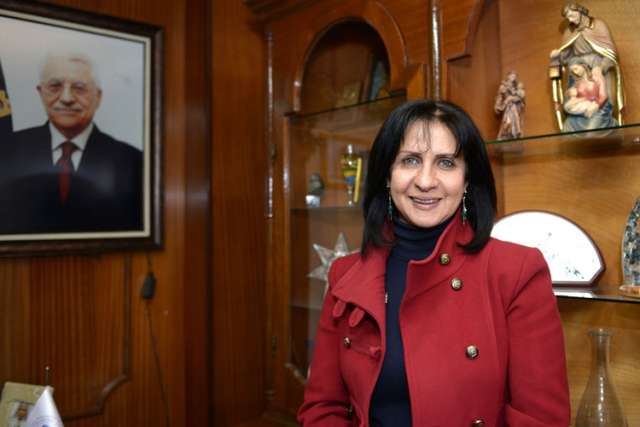BETHLEHEM — The visit of Pope Francis, though initially intended to be a simple ecumenical meeting with the Patriarch of Constantinople, has turned into an enormous opportunity for His Holiness to reaffirm his commitment to peace and justice in a land that so desperately craves these things.
The people of Palestine, Christians and Muslims, are anxious to hear a word of hope in the Holy Mass to take place in the Manger Square in Bethlehem (May 25) in front of the Nativity Church where Jesus — the messenger of peace, love and hope — was born.
Francis’ visit is both timely and crucial. We Palestinians heard him clearly when he said: “We must restore hope to young people, help the old, be open to the future and spread love. Be poor among the poor. We need to include the excluded and preach peace.”
The visit will not only restore hope to Palestinian youth but to our “excluded” Palestinian nation as a whole. We are excluded from justice in multiple matters. Since 1948, when we were first dispossessed of our homes and lands by the nascent state of Israel, the Palestinian nation has suffered injustice and oppression that have imperiled dignified and empowered living.
We are the occupied, refugees, double refugees, detainees and deportees. The injustice meted out to us goes on today with further land confiscations and the building of settlements on 1967 land intended, we thought, for a minimal Palestinian state. Even this week, the Tent of Nations farm, which has been visited by thousands of people around the world, was raided by the Israeli military and 1,500 apple and apricot trees uprooted. We ask the pope to speak of the injustices he will see — not least the monstrous wall that now cuts through holy Bethlehem, marring our landscape and wounding the sanctity of this place that means so much to so many.
We expect that the pilgrimage to the Holy Land in general and to Palestine in particular will provide the Holy See with a unique opportunity to reaffirm the principles of peace and justice upon which the social doctrine of the Catholic Church has been built. We long for a firm position against the injustices being committed against our nation, whether against Christians or Muslims. His words could do much to reinvigorate a peace process that we fear Prime Minister Benjamin Netanyahu does not take seriously.
Christian Palestinians would benefit from encouragement to remain rooted to this land, notwithstanding the numerous Israeli policies intended to make life difficult for all Palestinians.
Bethlehem and its sister cities still endure a condition that jeopardizes development and the dignified living of citizens. Walled on three sides and with 22 settlements built within the district’s borders, facing a scarcity of water, even as water flows freely in Israeli settlements, and suffering a rate of unemployment that reaches to 25.7 percent, Bethlehem’s people still eke out an existence in this troubled land where the practice of virtues and values was behind the teachings of Moses, Jesus and the Prophet Muhammad.
In Bethlehem, the moment of the Nativity took place, and in Jerusalem the moments of the Crucifixion and Resurrection occurred. The wall, however, breaches the literal path of faith and makes the connection between the Bethlehemite faithful and their places of worship in Jerusalem a mirage.
We now have a generation of young people who cannot readily go to pray in the Church of the Holy Sepulchre or Al-Aqsa Mosque. This should trouble the conscience of Christians around the world, particularly those for whom the Israeli government can do no wrong.
Bethlehem holds both the gates of salvation and the gates of discrimination and oppression.
For this reason we heed Pope Francis. We pray that Francis’ visit to the Holy Land will be supported by the faithful of the three religions, to create a space in which the good seed of peace can grow. Here, he will find a warm welcome in Palestine; the living stones and holders of the Bethlehem Star eagerly await.
(Baboun is the mayor of Bethlehem.)


